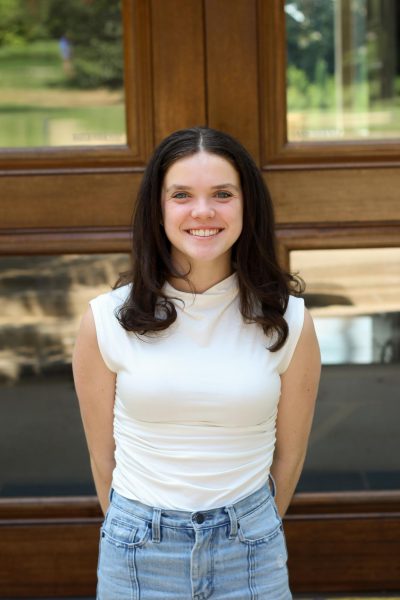Dr. Phillip Swagel, the current Director of the Congressional Budget Office (CBO), came to visit Wofford on Oct. 29 to encourage students interested in public service to pursue those careers.
He has had a vast career in government, serving as chief of staff for the Council of Economic Advisers and as Assistant Secretary for Economic Policy at the Treasury Department under President George W. Bush. He also served as an Economist for the International Monetary Fund.
Throughout his career, Dr. Swagel has taught at renowned universities, including Northwestern, the University of Chicago, Georgetown, and the University of Maryland. He views his dual career in academia and government as natural, allowing him to pursue his lifelong interests.
“I’m interested in policy, I’m interested in economics and analysis,” Swagel explained. “When I was growing up, at summer camp I would fish out the newspaper from the trash bin by the counselor’s rooms and read the newspaper. It was the LA Times.”
Despite the difference of executive and legislative branches, many of the issues Swagel tackled during his time as Assistant Secretary of Economic Policy at the Treasury inform his work today at the CBO, such as work on social security, medicare, energy, climate policy, and more.
Additionally, both his time at the Treasury and CBO was punctuated by a crisis. At the Treasury, he was involved in developing and implementing a timely policy in response to the 2008 financial crisis. At the CBO he provided Congress with analysis and information during the height of the Covid pandemic.
“The American people are counting on the government to respond and work toward that common aim,” Swagel said.
The CBO is a nonpartisan organization that analyzes economic and budgetary issues, allowing Congress to make informed decisions. In contrast to other public policy positions where party politics are influential, the CBO extensively analyzes data but does not advise on policy making.
“The CBO also has the satisfaction of being there to support the political system, whichever way it goes, and not injecting my opinion or my colleague’s opinions into it, but just providing analysis,” Swagel said.
Additionally, the CBO also provides economic projections. Their ten-year projection depicted an anomaly in the federal deficit. The deficit is predicted to grow from an estimated $1.9 trillion at the end of 2024 to $2.8 trillion in 2024. Despite the current stability of the economy, the deficit is still growing, which is counterintuitive.
“It’s just an extraordinary deficit at a time when the economy has recovered from the pandemic. The job market is reasonably strong, inflation is down, and yet we have this gigantic deficit,” Swagel said. “It’s extraordinary in the sense that it’s unusual.”
Large deficits like this occur during times of economic crisis, such as the pandemic and the 2008 financial crisis. Oftentimes following wars the federal budget deficit increases, but historically wartime deficit is paid off.
Despite the nation’s recovery from the pandemic, the deficit continues to increase with no current law or plan to pay it off.
“I can do the arithmetic and say it’s both revenues and it’s spending, but that is ultimately a political question,” Swagel said. “What kind of nation do we want? What kind of government do we want? And I’m comfortable that’s beyond CBO.”
The CBO has the unique ability to positively aid the American people while remaining separated from politics. The CBO reports the facts and explains how conclusions are reached, but they have no part in the decisions of what to do with these conclusions.
The CBO website currently has openings for assistant analysts for 2025 graduates. Swagel urges Wofford students to apply, as assistant analysts not only get the opportunity to work in Washington D.C. following their graduation but they are given immense responsibility and acquire extensive knowledge.
“It’s a good brand name, right? The kind a law school is going to know,” Swagel states.
The CBO hires many economics and business majors who are comfortable working with spreadsheets. However, they also have other departments, such as their national security group, in which they are interested in majors in political science or engineering.
“D.C., is a transient place. Capitol Hill staff– being a 22-year-old recent college grad on Capitol Hill edge, the world is in front of you,” Swagel said.
In the current divisive political climate, the CBO has the luxury of being next to politics by supporting the American political system without being a part of politics. In Washington D.C., specifically, Swagel sees the prevalence of what people view as an existential election weighs on people’s minds.
“I hope as a nation, we come together. Whatever the outcome is, we have challenges in front of us and hopefully we can figure out a way to forever work together and address them,” Swagel said.






























